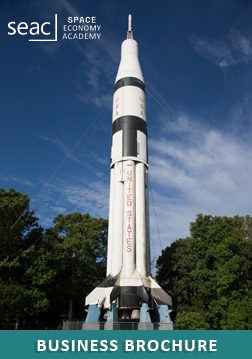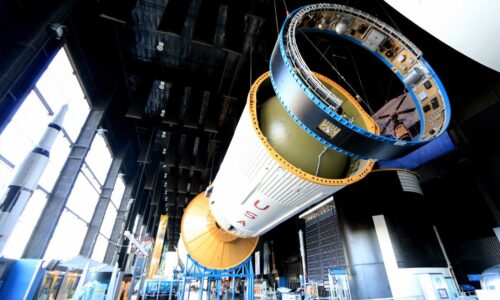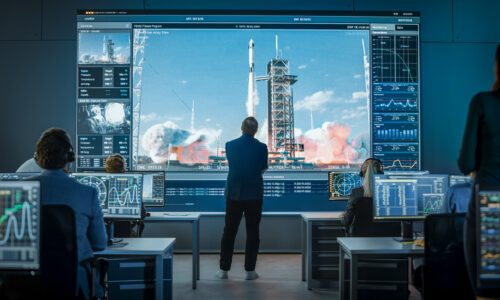Executive Space Economy and Entrepreneurship Program
Limited places
Deadline: 21 August, 2026
Starts: 27 September, 2026
- Space
- 27 (Registered)
 Download the Brochure
Download the Brochure
Space Economy in Figures
The space economy has become one of the most dynamic and strategic global industries. It has evolved from a public-sector-driven domain into a highly competitive commercial ecosystem shaped by the new space economy. The global space economy has surpassed 540 billion USD in value. It has grown by more than 90% over the last decade, and current estimates project it could exceed 1 trillion USD by 2040. This sustained growth is driven by the rise of New Space companies. It is also supported by the expansion of commercial space business models and a sharp increase in private investment. Total private investment has reached nearly 300 billion USD across more than 1,800 space ventures worldwide.
Downstream markets such as Earth observation, satellite communications and data-enabled services account for over 70% of total space economy revenues. These applications integrate space technologies into sectors including finance, energy, agriculture and climate monitoring. Today, more than 10,000 companies operate across upstream and downstream segments. The ecosystem is supported by approximately 5,000 active investors worldwide. Despite these opportunities, more than 50% of space startups fail in their early stages. This failure rate highlights the critical role of entrepreneurship, finance and business development skills. It also reinforces the need for executive programs focused on space economy entrepreneurship and sustainable space business creation. Objectives of the Program
Objectives of the Program
The Executive Program in Space Economy and Entrepreneurship has been designed to equip participants with strategic, technical and business skills. These skills are required to operate and grow professionally within the space economy and the new space economy. One of the core objectives of the program is to make the space sector accessible to non-aerospace professionals. It is aimed at those who want to understand how space technologies, missions and applications create economic value. At the same time, the program is highly relevant for aerospace engineers and professionals already working in the space industry. It supports those who want to strengthen their knowledge of finance, entrepreneurship and business development, one of the fastest-growing professional profiles in the space sector.
Throughout the program, participants develop a clear understanding of upstream and downstream markets. They also explore Earth observation applications and space-enabled services. Participants learn how to translate technical capabilities into market-driven business opportunities. The executive program places strong emphasis on business development, financial planning and go-to-market strategy. This enables participants to structure viable projects, startups or internal business initiatives. By the end of the program, participants build a complete business plan. They also design a fundraising strategy and deliver a professional pitch for public funding and equity investment discussions.
Methodology and Learning Approach
The Executive Program in Space Economy and Entrepreneurship follows a highly practical, executive-oriented methodology based on learning by doing and has been developed by the first academy worldwide to launch a dedicated program in Space Economy. The program is delivered by two experts from industry with extensive experience in space technologies, products, business development and finance. This practice-led approach enabled SEAC to be part of the ESA Business Incubation Centre (ESA BIC Hessen) and to be recognized as first-prize winner of the Galileo Masters University Challenge, reinforcing its strong positioning within the European space ecosystem.
The program integrates knowledge acquisition with continuous project development. Participants begin by strengthening their foundational understanding of the space economy and space operations through self-paced introductory courses designed for working professionals, included as part of the program. These courses provide a structured overview of New Space dynamics, upstream and downstream markets, space missions, satellite systems, Earth observation and space-enabled services.
During the live online workshops, participants work step by step on the creation of a complete Business Plan and an investor-ready Pitch Deck, specifically designed for public funding applications and equity fundraising. The project is developed using the Business Model Canvas methodology, ensuring a clear and structured approach from problem definition to value creation.
Program Structure and Delivery
Program Duration
The Executive Program in Space Economy and Entrepreneurship runs over a total duration of four months in a flexible executive format. It combines self-paced learning, live online workshops and personalized follow-up designed for working professionals.
Phase 1 – Self-Learning Foundations (1 Month)
One month of structured and flexible self-paced learning covering Space Economy and Space Operations. This phase builds a solid, shared technical and conceptual baseline across all participant profiles.
Phase 2 – Live Online Workshops & Project Development (2 Months)
Live online workshops are held every two weeks on Sundays to maximize attendance and flexibility. Participants work closely with two industry experts, with all sessions recorded and available on the SEAC platform.
Final Project Presentation
Participants deliver a professional, investor-ready final project pitch at the end of the workshops phase. The presentation simulates real investor meetings and institutional funding evaluation processes.
Professional Certificate
Participants receive the SEAC Professional Certificate in Space Economy and Entrepreneurship upon successful completion of the program. The certificate validates executive-level training, applied learning outcomes and project-based work.
Phase 3 – Follow-Up & Individual Tutoring (1 Month)
The program concludes with individual tutoring and personalized strategic follow-up. This phase supports refinement of business plans, fundraising strategies and clearly defined next development steps.
 Download the Brochure
Download the Brochure
Curriculum
- 3 Sections
- 20 Lessons
- Lifetime
- Self-Paced Online Foundations (1 Month)8
- 1.1Space Economy Fundamentals and New Space Ecosystem
- 1.2Upstream and Downstream Space Markets
- 1.3Space Technologies, Missions and Applications
- 1.4Earth Observation and Space-Enabled Services
- 1.5Space Operations and Satellite Systems Overview
- 1.6Space Policy, Public Investment and Institutional Frameworks
- 1.7Innovation Models, TRL and Risk Management in Space
- 1.8Market Trends and Opportunities in the New Space Economy
- Live Online Project Work & Workshops (2 Months)8
- 2.1Project Definition, Objectives and Strategic Scope
- 2.2Business Model Design using the Canvas Method
- 2.3Product or Service Definition and Value Proposition
- 2.4Market Analysis, Competition and Go-to-Market Strategy
- 2.5Business Development and Sales Strategy
- 2.6Financial Planning and Cost Structure
- 2.7Public Funding, Private Investment and Fundraising Strategy
- 2.8Investor-Ready Pitch Deck Development
- Individual Tutoring & Project Monitoring (1 Month)Analyze the submitted project and valuate progress on revisions and check milestones.4
Lecturer
Dr. Lucia Fonseca de la Bella is the Faculty Strategic Project Manager for the Space Sector at the University of Surrey, where she leads the development of the new Surrey Space Economy Institute. In this role, Dr. Fonseca supports the University’s research and innovation strategies in the space sector, while also developing initiatives to strengthen partnerships with key industry players. Previously, she served as the European Space Agency's Business Applications Ambassador in the UK, a position in which she helped non-space companies incorporate space assets into their operations.









